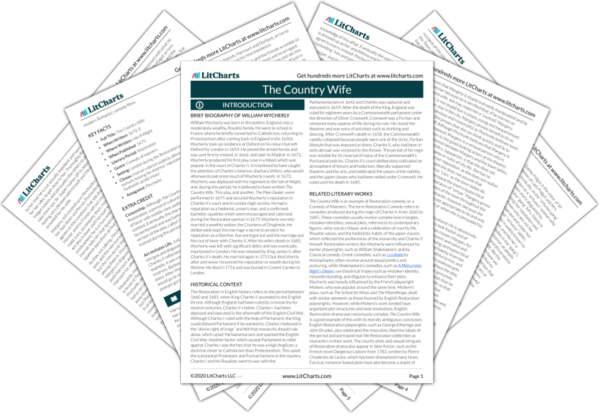Reputation, Appearance, and Hypocrisy
William Wycherly’s The Country Wife criticizes Restoration society (late 17th century England) for its hypocrisy. Harry Horner, a wealthy “rake” who spends his time pursuing women and hedonism, spreads a rumor that he has contracted a venereal disease and has been made impotent. Although this destroys Horner’s reputation, he uses this to his advantage to seek out “honorable” women and conduct affairs with them because he knows that their husbands, and…
read analysis of Reputation, Appearance, and HypocrisyLove, Marriage, and Misogyny
Marriage is not depicted as a symbol of love in The Country Wife and, instead, is associated with qualities such as hatred, greed, and misogyny. In the Restoration period, marriages were commonly viewed as transactions, especially among wealthy class people, and were often arranged for material and social reasons rather than because the couple were in love. Wycherly is critical of this model for marriage and portrays married life as an unnatural, unpleasant state that…
read analysis of Love, Marriage, and MisogynyTheatre, Puritanism, and Forbidden Desire
Throughout The Country Wife, Wycherly uses theatrical devices, such as disguise and costume changes, to suggest that the more something is forbidden, the more titillating and attractive it becomes. The Restoration was a period of rebellion against Puritanism, which was enforced in England after the defeat of Charles I in the English Civil War. During this period of Puritan rule, theatres were closed and activities such as dancing and drinking were heavily censored. After…
read analysis of Theatre, Puritanism, and Forbidden Desire
Town vs. Country
In The Country Wife, Pinchwife, an older man who is terrified of being cheated on and made a “cuckold,” marries a young woman, Margery, from the country because he believes that she is less likely to cheat on him than a city wife. This implies that people from the country are simple and uneducated compared with sophisticated and cosmopolitan town dwellers and relates to popular notions from the Restoration period…
read analysis of Town vs. Country






